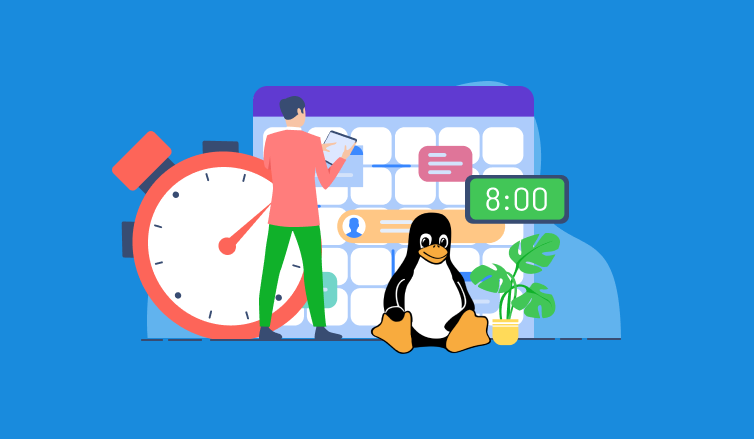
Linux distributions are widely used as server operating systems due to their security and reliability. Being in general not really popular for desktops, various Linux flavors are still used by freelancers and office employees on their personal computers.
A lot of Linux compatible timekeeping solutions are available on the market. Many of them are free and open-source, which is a plus. The bad thing is that this software is mostly buggy and requires additional effort during installation and configuration. But we did some research and found some great and simple-to-use Linux timesheet tools.
Let’s check them out!
1. actiTIME
Key features:
- Intuitive interface
- Timesheets
- Work management
- Comments
- Reports
- Payroll calculation
- Invoicing
actiTIME runs as a web application in the cloud or on the company’s internal server. The cloud solution is accessible from any device that can be connected to the Internet. As for the self-hosted option, it is compatible with both Windows and Linux platforms.
Besides intuitive weekly timesheets, actiTIME has an impressive task management module. You can use it to plan out your projects, assign tasks to employees, set deadlines and priorities, and monitor work progress in real time.
On top of that, you can generate detailed reports in just a few clicks and get in-depth insights into your team or personal productivity and financial data (such as work profitability and staff-related costs).
In sum, actiTIME is useful for project managers, accountants, HRs, all office employees, and freelancers who need to keep track of their time. It helps companies of any size and self-employed individuals organize their workflow and have better control over their individual productivity, team performance, and profitability of specific projects.

We reduced payroll processing to 45 minutes per week
actiTIME is very robust, integrated well into your business process, and most importantly, helps you focus on your business instead of monkeying around with technology. actiTIME has reduced our payroll processing from 4-6 hours per week to 45 minutes per week.
2. Project Hamster
Key features:
- Time logs
- Calculation of totals
- Data export with HTML reports
- Reports
This open-source gem is designed for freelancers, project managers, and anyone in between who wants to keep an eagle eye on how their time is spent. With its help, you can start, stop, and record tasks with a few clicks, analyze your productivity patterns, and then prioritize work more effectively.
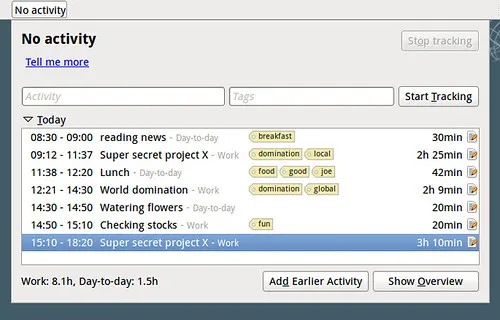
To track work hours in Hamster, change your activity in the program when switching from one task to another. The program counts time totals and shows them in the interface. To simplify search through your historical data and categorize time entries, tag your activities.
The entries will be split by tags and shown in the Statistics section. Adding descriptions to the activities helps keep track of specific parts of work in the overall progress.
3. Kimai
Key features:
- Basic time tracking
- Invoicing
- Simple budget management
Kimai is an open-source timesheet application that works as a web service. The program allows you to configure regular worker, admin, and customer accounts with different data access levels.
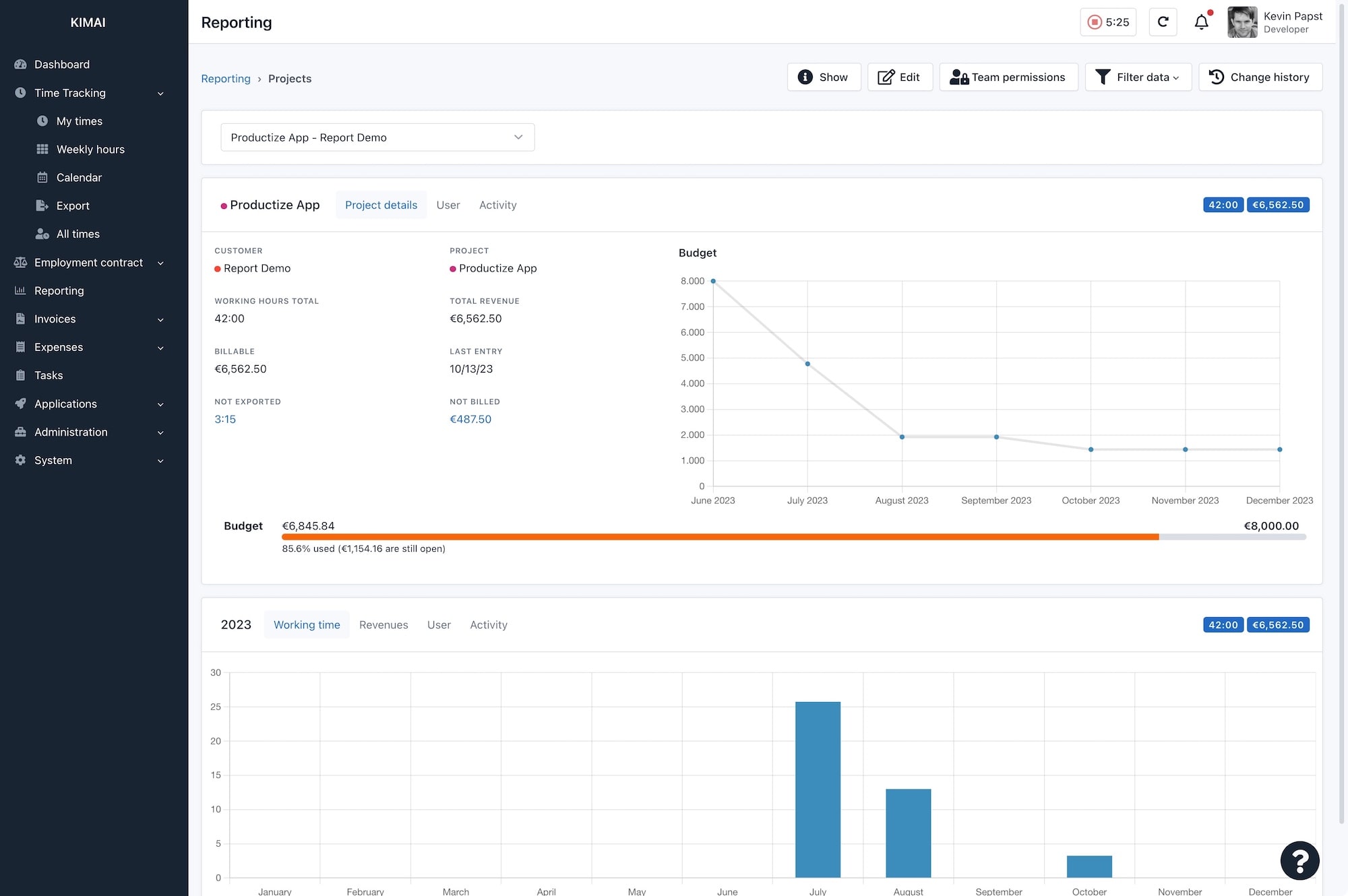
Users can track their time with a timer and then, if necessary, edit their entries. As for cost and billing features, Kimai supports user rates, entry of project budgets and expenses, as well as invoice export.
4. Rachota
Key features:
- Hour tracking
- Data collection and analysis
- Invoicing
- Reports
Rachota is a portable timesheet software that analyzes productivity data and suggests hints on how to use this resource more efficiently. It is suitable for Linux, Windows, and Mac OS X.
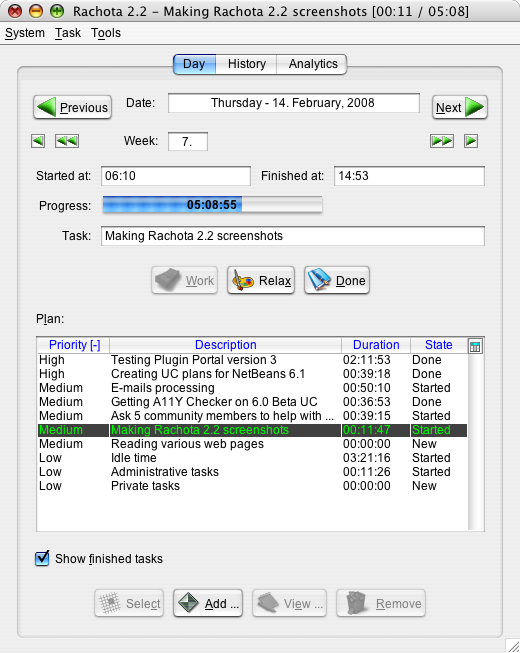
Basically, it can run everywhere, as it allows to keep hour tracking data on a USB drive. Besides, Rachota is an open-source solution, so it’s totally free.
Unlike many other apps, it is localized into 10 languages which simplifies hour tracking for those who are not proficient in English.
5. KTimeTracker
Key features:
- Simple time tracking
- Basic to-do and task list management
- Data summaries
This app is a time tracking module of Kontact, the personal information manager for the KDE desktop environment.
With KTimeTracker, time expenses are calculated automatically; the user only needs to start and stop the timer. The application also allows to edit already recorded time, if necessary. The tool’s configuration options are quite simple: they include idle time detection, time-saving frequency, and displayed details. So it’s a good choice for those who don’t need more than just keep track of daily time expenses.
6. GnoTime
Key features:
- Simple interfaces
- Basic hour tracking
- Billing
- HTML Reports
This Gnome timesheet tool is distributed under the GNU GLP license, so it’s free software. It is designed for Unix systems (so it runs not only on Linux but also on Mac OS X). Like in many other timesheet solutions for Linux, a timer is provided for recording time expenses.
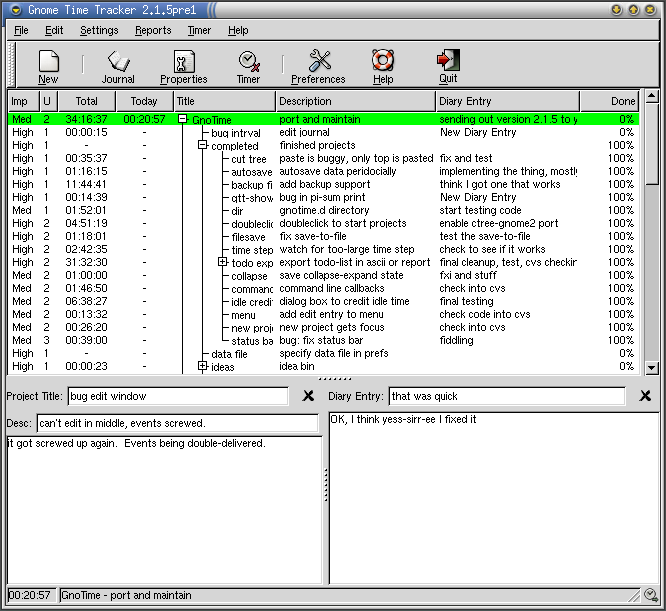
The specific feature of this app is auto-merging short time intervals recorded for one task. The length of the intervals to be merged is defined by the user. Moreover, each entry has a “billing status” parameter: it can be flagged as billable or non-billable, and billing rates can be set up. Urgency and completion statuses are also provided.
7. Fanurio
Key features:
- Automatic and manual hour tracking
- Billing and invoicing
- Idle time detection
- Reminders
The Fanurio app is mostly used by freelancers. It supports Windows and Unix systems and can run from a USB drive on any computer, which is convenient for those who work from different locations.
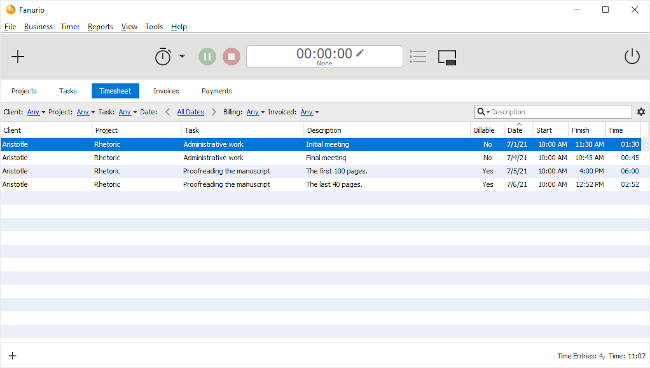
The app’s specific feature is smart timing that combines idle time detection and reminders – just in case you forgot to start the timer. Its billing functionality includes invoices that contain detailed data on works performed and amounts billed for them.
8. arbtt
Key features:
- Automatic time logging
- Data summaries and reports
ARBTT means “automatic rule-based time tracker”, so the user doesn’t need to enter anything manually. The program records which windows have been open and active and for how long, and then calculates the time.
The product supports both Windows and Linux and is distributed under the GPL license. No updates seem to have been released since early 2014, but arbtt is still available for download on the developer’s website.
9. DeskTime
Key features:
- Automated timesheets
- Break reminders
- Productivity reports
DeskTime is an intuitive timesheet tool designed to boost productivity, especially in remote and hybrid work environments. It runs quietly in the background, monitoring computer usage to distinguish between real work and slack-off time.
DeskTime offers insights into how work happens, empowering both individual users and entire teams to identify productivity patterns, optimize workflows, and manage time more effectively.
With features like automatic timesheets, URL and app tracking, and detailed productivity reports, DeskTime provides a comprehensive snapshot of your workday, making it easier to focus on what matters most and make data-driven decisions that enhance productivity.
10. GTimeLog
Key features:
- Time tracking
- Activity reports
GTimeLog is a small GTK+ application for timekeeping. The developer says it is designed to be as unintrusive as possible, so it provides simple hour tracking functionality. When you arrive to work and start the workday, start up the app and type in it “arrived.” After finishing each activity throughout the workday, enter the name of this activity in the GTimeLog prompt.
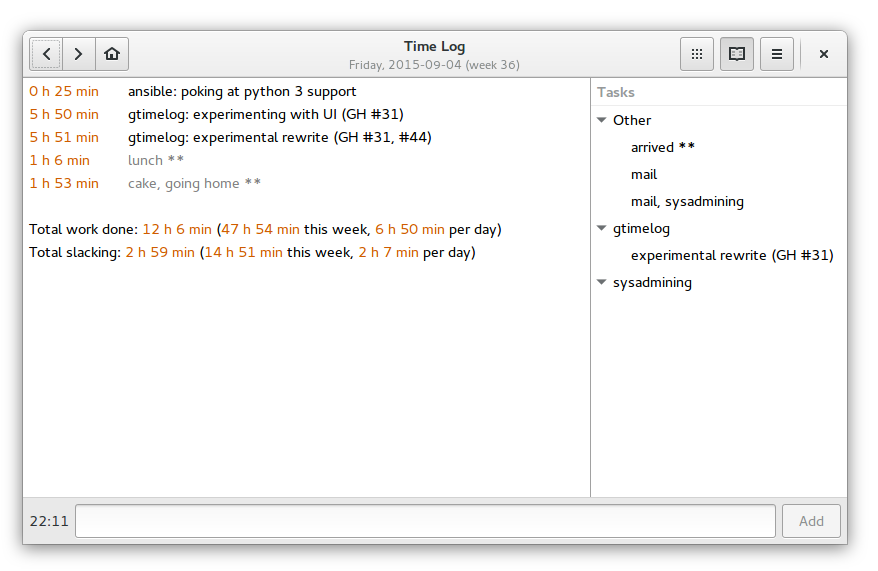
The program calculates your time expenses and creates an activity report at the end of the day that shows how much time you have spent working and “slacking.” Simple configuration options are available: there are commands to flag specific activities as non-related to work, or to completely omit them in daily reports.
Conclusion
Linux timesheet software is beneficial for teams and individuals aiming to boost work productivity and learn how to manage their resources more efficiency.
Among the sea of tools available, actiTIME stands out with its ease of use and comprehensive functionality. Whether you prefer tracking time online or desire to install a self-hosted solution on your Linux system, actiTIME caters to every need.
Experience actiTIME firsthand and make every second count!












































